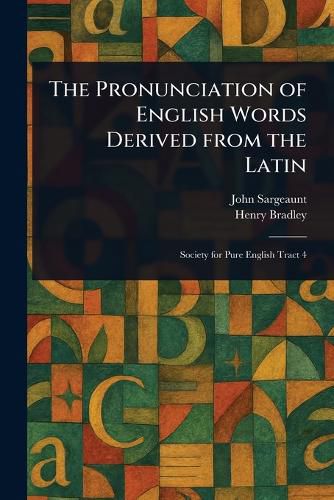Readings Newsletter
Become a Readings Member to make your shopping experience even easier.
Sign in or sign up for free!
You’re not far away from qualifying for FREE standard shipping within Australia
You’ve qualified for FREE standard shipping within Australia
The cart is loading…






This title is printed to order. This book may have been self-published. If so, we cannot guarantee the quality of the content. In the main most books will have gone through the editing process however some may not. We therefore suggest that you be aware of this before ordering this book. If in doubt check either the author or publisher’s details as we are unable to accept any returns unless they are faulty. Please contact us if you have any questions.
Explore the fascinating intersection of Latin and English with "Society for Pure English, Tract 4: The Pronunciation of English Words Derived from the Latin," by John Sargeaunt. This meticulously republished tract delves into the lasting influence of Latin on the English language, with a specific focus on pronunciation.
A valuable resource for anyone interested in linguistics, grammar, or the history of the English language, this work provides insightful analysis of how Latin roots have shaped the sounds of English words. Sargeaunt's exploration offers a detailed examination of pronunciation patterns and the evolution of language.
Whether you're a language enthusiast, a student of linguistics, or simply curious about the origins of English, this tract offers a unique and informative perspective on a vital aspect of language development. A key addition to any reference library, it sheds light on the enduring legacy of Latin in the English lexicon.
This work has been selected by scholars as being culturally important, and is part of the knowledge base of civilization as we know it.
This work is in the public domain in the United States of America, and possibly other nations. Within the United States, you may freely copy and distribute this work, as no entity (individual or corporate) has a copyright on the body of the work.
Scholars believe, and we concur, that this work is important enough to be preserved, reproduced, and made generally available to the public. We appreciate your support of the preservation process, and thank you for being an important part of keeping this knowledge alive and relevant.
$9.00 standard shipping within Australia
FREE standard shipping within Australia for orders over $100.00
Express & International shipping calculated at checkout
This title is printed to order. This book may have been self-published. If so, we cannot guarantee the quality of the content. In the main most books will have gone through the editing process however some may not. We therefore suggest that you be aware of this before ordering this book. If in doubt check either the author or publisher’s details as we are unable to accept any returns unless they are faulty. Please contact us if you have any questions.
Explore the fascinating intersection of Latin and English with "Society for Pure English, Tract 4: The Pronunciation of English Words Derived from the Latin," by John Sargeaunt. This meticulously republished tract delves into the lasting influence of Latin on the English language, with a specific focus on pronunciation.
A valuable resource for anyone interested in linguistics, grammar, or the history of the English language, this work provides insightful analysis of how Latin roots have shaped the sounds of English words. Sargeaunt's exploration offers a detailed examination of pronunciation patterns and the evolution of language.
Whether you're a language enthusiast, a student of linguistics, or simply curious about the origins of English, this tract offers a unique and informative perspective on a vital aspect of language development. A key addition to any reference library, it sheds light on the enduring legacy of Latin in the English lexicon.
This work has been selected by scholars as being culturally important, and is part of the knowledge base of civilization as we know it.
This work is in the public domain in the United States of America, and possibly other nations. Within the United States, you may freely copy and distribute this work, as no entity (individual or corporate) has a copyright on the body of the work.
Scholars believe, and we concur, that this work is important enough to be preserved, reproduced, and made generally available to the public. We appreciate your support of the preservation process, and thank you for being an important part of keeping this knowledge alive and relevant.